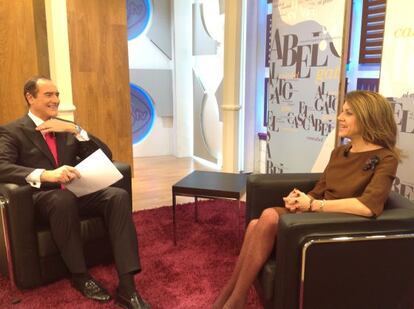Searching for viewers with Catholic tastes
A battle is raging between two digital channels for the most conservative audience


It's not uncommon for TV channels to try and outdo each other in terms of pushing the boundaries of good taste, in a bid to win higher ratings. But on Spain's Digital Terrestrial Television channels, there is a battle going on over who can be the most conservative, the most Catholic - and it's all in a bid to win a similar ratings war.
Intereconomía and 13 TV use slogans such as "Proud to be right-wing," and their selling points lie in their high-voltage political talk shows, which attract nearly a million viewers every night. Five months ago, both stations were tied in the audience ratings, with equal shares of 1.1 percent. But things have changed significantly since then: 13 TV has taken off, reaching a 1.5 percent share, while Intereconomía has dropped to 1 percent.
This "miracle" was reinforced by the fact that Antonio Jiménez, the journalist who hosted Intereconomía's flagship debate show, El gato al agua , defected to the rival station with a nearly identical program, El cascabel al gato . The premiere of this show included an interview with María Dolores de Cospedal, secretary general of Spain's ruling conservative Popular Party (PP), as well as an audio interview with former party treasurer Luis Bárcenas, lately in the limelight for his alleged involvement in corruption cases and illegal party funding. That night, the audience figures reached 826,000 viewers, dropping down to 560,000 the next day.
Despite the tremendous similarities between both stations, at least at first glance, both like to stress what they view as their irreconcilable differences.
We don't practice fawning journalism and we are able to criticize [Prime Minister Mariano] Rajoy's government"
"We are a professional television station while Intereconomía is an opportunistic station that got strong under the [Socialist administration of José Luis Rodríguez] Zapatero because of its criticism of his government. But when this added value disappeared, it was unable to keep up," says an executive at 13 TV, in which the Spanish bishops hold a majority stake of 56 percent. Describing Intereconomía as "a political instrument that has lost the meaning that gave it notoriety," the same source says that "it has no structure and no solid business foundation.
"Meanwhile, Intereconomía has similar criticism for the channel that took away its star host. "We don't practice fawning journalism and we are able to criticize [Prime Minister Mariano] Rajoy's government," claims Javier Algarra, news editor and now host of El gato al agua. "We don't care who is in power. We are not a party-led station, but rather one of principles."
Intereconomía holds that 13 TV has political support from the PP and financial clout from the Spanish Catholic Church, and that furthermore it has copied its political debate talk-show model. It notes that back in 2005 nobody saw any future in a type of program that has since spawned many imitators.
Neither one of these stations conceals their goal of reaching a very specific audience. Intereconomía, the brainchild of former PP deputy Julio Ariza and former banker Mario Conde, explains that "we are not left-leaning and we are not socialists; we believe in social justice, we are Catholic, and we defend the rights of citizens. What other media outlets defend is the PP, applauding everything it does."
13 TV does not disguise its Catholic ideas either. "But we are not a religious channel. The Episcopal Conference does not meddle in our affairs," say sources at the company, which boasts about its "plurality" and room for all kinds of programs, such as news, films, entertainment and televised church services. Its latest projects include an early-morning children's program that will bring back Miliki, a popular television clown from the 1970s, and a sports show. There is also an abundance of movies, albeit of the old, classic kind.
What's more, 13 TV boasts about its "austerity." It is run on an annual budget of 18 million euros, and its stated goal is to no longer be making a loss by 2014. To prove how austere it is, the station said that it hired the host of El cascabel al gato for less than he was making at Intereconomía. "The problem is that he had not been paid for the last four months," said a source.
Intereconomía admits that it is going through "very serious" financial problems and has trouble paying its employees' wages, although it hopes to be able to "survive without pledging allegiance to a specific party."
Tu suscripción se está usando en otro dispositivo
¿Quieres añadir otro usuario a tu suscripción?
Si continúas leyendo en este dispositivo, no se podrá leer en el otro.
FlechaTu suscripción se está usando en otro dispositivo y solo puedes acceder a EL PAÍS desde un dispositivo a la vez.
Si quieres compartir tu cuenta, cambia tu suscripción a la modalidad Premium, así podrás añadir otro usuario. Cada uno accederá con su propia cuenta de email, lo que os permitirá personalizar vuestra experiencia en EL PAÍS.
¿Tienes una suscripción de empresa? Accede aquí para contratar más cuentas.
En el caso de no saber quién está usando tu cuenta, te recomendamos cambiar tu contraseña aquí.
Si decides continuar compartiendo tu cuenta, este mensaje se mostrará en tu dispositivo y en el de la otra persona que está usando tu cuenta de forma indefinida, afectando a tu experiencia de lectura. Puedes consultar aquí los términos y condiciones de la suscripción digital.








































